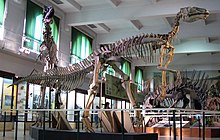Huallasaurus
| Huallasaurus Temporal range: Late Cretaceous,
~ | |
|---|---|

| |
| Reconstructed skeleton at Natural Sciences Museum | |
| Scientific classification | |
| Domain: | Eukaryota |
| Kingdom: | Animalia |
| Phylum: | Chordata |
| Clade: | Dinosauria |
| Clade: | †Ornithischia |
| Clade: | †Neornithischia |
| Clade: | †Ornithopoda |
| Family: | †Hadrosauridae |
| Subfamily: | †Saurolophinae |
| Clade: | †Austrokritosauria |
| Genus: | †Huallasaurus Rozadilla et al., 2022 |
| Species: | †H. australis
|
| Binomial name | |
| †Huallasaurus australis | |
| Synonyms | |
| |
Huallasaurus (meaning "duck lizard") is an extinct genus of saurolophine hadrosaur from the Late Cretaceous Los Alamitos Formation of Patagonia in Argentina. The type and only species is H. australis. Originally named as a species of Kritosaurus in 1984,[1] it was long considered a synonym of Secernosaurus[2] before being recognized as its own distinct genus in a 2022 study, different from other members of Kritosaurini.[3]
Discovery
[edit]The generic name, "Huallasaurus," combines "hualla," the Mapudungun word for "duck," and the Greek "sauros," meaning "lizard." The specific name, "australis," is derived from the Latin "australis," meaning "southern," after the discovery of the holotype specimen in southern Argentina.[3][1]
Classification
[edit]
Rozadilla et al. (2022) named Huallasaurus and the closely related Kelumapusaura, recovering them in a clade of entirely South American saurolophines.[3] In the 2023 description of the South American hadrosauroid Gonkoken, Alarcón-Muñoz et al. recovered similar results, implementing a modified version of the phylogenetic matrix of Rozadilla et al. They named the clade containing Huallasaurus, Kelumapusaura, and other South American saurolophines as the Austrokritosauria, recovering it as the sister taxon to the Kritosaurini. The results of their phylogenetic analyses of Saurolophinae are displayed in the cladogram below:[4]
Paleoecology
[edit]Huallasaurus is known from the Late Cretaceous Los Alamitos Formation of Río Negro Province, Argentina. Aeolosaurus rionegrinus, a titanosaurian sauropod, has also been named from this formation.[3]
References
[edit]- ^ a b Bonaparte, José; Franchi, M.R.; Powell, J.E.; Sepulveda, E. (1984). "La Formación Los Alamitos (Campaniano-Maastrichtiano) del sudeste de Rio Negro, con descripcion de Kritosaurus australis n. sp. (Hadrosauridae). Significado paleogeografico de los vertebrados". Revista de la Asociación Geológica Argentina (in Spanish). 39 (3–4): 284–299.
- ^ Prieto–Marquez, Alberto; Salinas, Guillermo C. (2010). "A re–evaluation of Secernosaurus koerneri and Kritosaurus australis (Dinosauria, Hadrosauridae) from the Late Cretaceous of Argentina". Journal of Vertebrate Paleontology. 30 (3): 813–837. Bibcode:2010JVPal..30..813P. doi:10.1080/02724631003763508. S2CID 85814033.
- ^ a b c d Rozadilla, Sebastián; Brissón-Egli, Federico; Lisandro Agnolín, Federico; Aranciaga-Rolando, Alexis Mauro; Novas, Fernando Emilio (2022). "A new hadrosaurid (Dinosauria: Ornithischia) from the Late Cretaceous of northern Patagonia and the radiation of South American hadrosaurids". Journal of Systematic Palaeontology. 19 (17): 1207–1235. doi:10.1080/14772019.2021.2020917. S2CID 247122005.
- ^ Alarcón-Muñoz, Jhonatan; Vargas, Alexander O.; Püschel, Hans P.; Soto-Acuña, Sergio; Manríquez, Leslie; Leppe, Marcelo; Kaluza, Jonatan; Milla, Verónica; Gutstein, Carolina S.; Palma-Liberona, José; Stinnesbeck, Wolfgang; Frey, Eberhard; Pino, Juan Pablo; Bajor, Dániel; Núñez, Elaine; Ortiz, Héctor; Rubilar-Rogers, David; Cruzado-Caballero, Penélope (2023-06-16). "Relict duck-billed dinosaurs survived into the last age of the dinosaurs in subantarctic Chile". Science Advances. 9 (24): eadg2456. Bibcode:2023SciA....9G2456A. doi:10.1126/sciadv.adg2456. ISSN 2375-2548. PMC 10275600. PMID 37327335.

